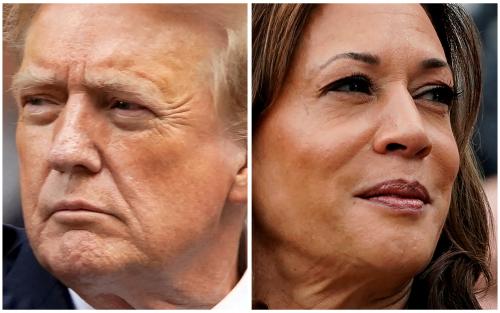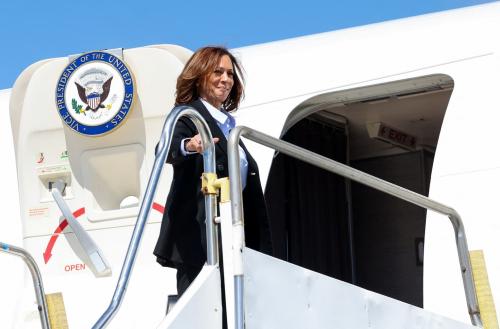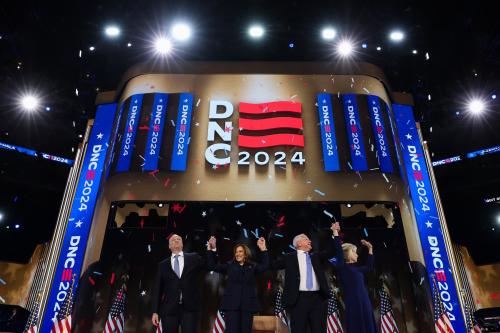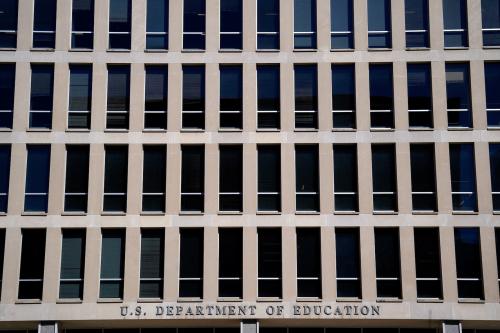This article is part of “Party platforms unpacked,” a series that compares the differences between the two major American political parties on important issues of the day.
K-12 education has captured its share of headlines over the last few years. Schools—and, specifically, local school boards—became a lightning rod for anger about the disruption caused by the COVID-19 pandemic. From the first weeks of the pandemic, Republicans accused Democratic leaders of being too slow to reopen schools. That accusation gained potency as evidence mounted that schools hadn’t been the vectors of COVID-19 transmission that experts initially feared. Sensing vulnerability, Democrats became reluctant to engage on K-12 issues, and Republicans such as Glenn Youngkin showed that Democrats wouldn’t put up much of a fight if education became a battlefield for culture war conflicts. The result was a dizzying, maddening stretch where schools were embroiled in controversies over critical race theory and transgender students’ rights when education leaders needed to focus on pandemic recovery.
Now, as memories of the pandemic recede, the politics of education are changing. Democrats are talking more about schools, emboldened by the selection of a former schoolteacher, Tim Walz, as Vice President Harris’s running mate. Republicans, for their part, have harnessed discontent with public schools into an aggressive push for private school voucher programs that threaten America’s public education systems.
The platforms of the Democratic and Republican parties, along with the education-related portions of Project 2025, provide a glimpse of where K-12 education might be headed.
The Democratic platform
The Democrats’ 2024 platform is light on specifics, with more attention to the current administration’s accomplishments and the would-be Harris administration’s support for some broadly defined goals (e.g., reducing chronic absenteeism). To some extent, the lack of specifics stands in contrast to both the Democrats’ 2020 platform—which, for example, pledged a tripling of Title I funds for high-needs schools—and more detailed 2024 proposals for early childhood education (e.g., free, universal pre-K) and higher education (e.g., free community college).
The 2024 platform does contain relevant, specific ideas outside of its “Education” section. For example, Democrats propose rebates for school districts that purchase electric school buses—an idea grounded in research on the harms of students’ exposure to toxins. They also offer specific proposals to reduce gun violence (amid a scourge of school shootings) and to strengthen civil rights protections for LGBTQ+ children and students of color (frequent targets of culture war attacks).
Notably, some of the platform’s clearest statements on education describe what Democrats oppose. That includes private-school voucher plans and policies hostile to transgender youth that have become increasingly popular among Republican leaders.
The Republican platform
Republicans’ 2024 platform is also light on policy specifics. The platform has a few ideas that have long been cornerstones of GOP education politics. That includes ending teacher tenure—an idea that would require local or state action and confront fierce opposition from teachers’ unions.
The platform has language about resisting political indoctrination in schools—while seeming to propose some indoctrination of its own. This includes proposals to “support schools that teach America’s Founding Principles and Western Civilization” and “promote Fair and Patriotic Civics Education.” Along similar lines, former President Trump recently described a bewildering plan to create a credentialing body to “certify teachers who embrace patriotic values, support our way of life, and understand that their job is not to indoctrinate children.”
Substantively, the most important part of the Republican education platform might be its support for universal school choice. In about a dozen states, Republicans have recently created or expanded education savings account (ESA) programs that make public funds available to pay for private school or other educational expenses. Critics of these programs—myself included—argue that they violate our basic traditions, benefit the wealthy at the expense of others, and are not well supported by research.
Project 2025
If the Republican platform is light on policy proposals, Project 2025 certainly is not.
Along with my colleagues Rachel Perera and Katharine Meyer, I recently wrote a more detailed piece that analyzes Project 2025’s education proposals. Project 2025 proposes severe cuts to the resources and protections available to the country’s poorest, most marginalized children. For example, it proposes to eliminate the Head Start program (for young children in poverty), discontinue federal Title I funding (for schools that serve low-income children), and kneecap IDEA (federal legislation that supports students with disabilities). It’s especially harsh on transgender children, with proposals aimed at reorienting civil rights enforcement around “rejecting gender ideology and critical race theory” and stripping Title IX protections from transgender students.
In other words, Project 2025 sets its sights on the programs that serve America’s neediest students. It would essentially terminate the federal government’s long-running role in addressing inequities that arise in locally governed school systems.
Notably, many key Project 2025 proposals would require an unlikely degree of congressional cooperation. This includes some of the highest-profile proposals, such as eliminating the U.S. Department of Education (a vaguely defined idea that’s unlikely to materialize in its most extreme form). Still, a second Trump administration could enact some Project 2025 proposals unilaterally. That includes rolling back civil rights protections and replacing civil servants in the U.S. Department of Education with political appointees after reinstating Schedule F.
Taking stock
It’s fair to say that Democrats’ plans for federal education policy are modest. Democrats aren’t proposing a markedly stronger role for the federal government. On K-12 education, Democrats remain in a mostly defensive posture as they offer a more “conservative” agenda that protects against the GOP’s increasingly radical efforts.
Just what those GOP plans might be—and just how radical they are—depends on whether the true Trump administration plan is the Republican platform, Project 2025, or some combination of the two. That remains to be seen.
The Brookings Institution is committed to quality, independence, and impact.
We are supported by a diverse array of funders. In line with our values and policies, each Brookings publication represents the sole views of its author(s).








Commentary
Democrats and Republicans on K-12 education: A comparison
September 5, 2024